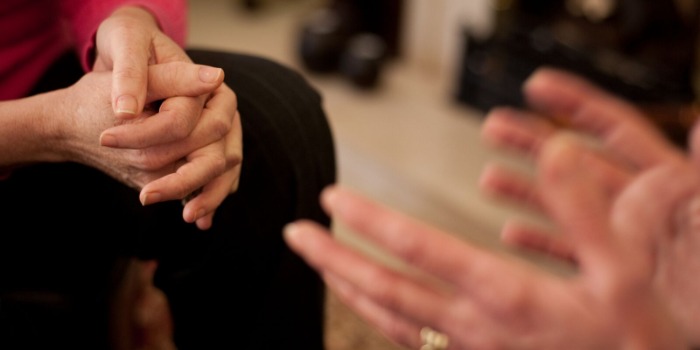Feel
Coming out as transgender: My story
Realising you are transgender is a lot for anyone to go through. I feel proud to be trans and to live my truth, but I also know how scary coming out can be. To mark National Coming Out Day (11 October), I’m sharing what coming out was like for me. Everyone’s experience will be different, but here I offer some advice for others thinking of doing the same.

Most people go through life without ever thinking about their gender identity. But for some of us, the sex we were assigned (given) when we’re born, doesn’t match up with who we really are. I always knew there was something different about me. I didn’t quite fit in as a kid and never felt comfortable in myself. When I was a teenager, I realised that this was because I was really a woman who had been assigned male at birth. In other words, I was transgender.
Unfortunately, I didn’t get access to the support I needed at that time. It took me another 10 years to start my transition (the change to living as a woman). It hasn’t been an easy journey, but my life has really improved since I came out and got access to the treatment I needed.
Whether you come out, who you come out to and what you decide to do are all your choice. But here are some tips for trans people who want to discuss their feelings with the people in their life.
Getting ready
Before talking to anyone, it might help to discuss your feelings privately or in a safe space. There are many LGBTQ+ charities who can provide confidential support and resources. You might find it helpful to speak to a mental health support charity such as Samaritans or Mind. You could also seek help from a qualified therapist or counsellor.
When you’re ready to come out to someone who knows you, it can be helpful to write down your feelings before you speak to them. You could try thinking of some clear sentences or phrases that you feel are important for you to say during the conversation. You might also find writing a letter helps.
It can also be helpful to have an idea about how you’d like to be treated. For example, you may have preferred pronouns (she, he, they etc) that you’d like them to use.
It’s also alright if you’re not sure about these things. You don’t have to know exactly what identity fits you best, how you want to live socially or what treatment (if any) you might seek in future.
Coming out to your partner
Coming out to a partner can be really daunting. I knew how much I loved my fiancée, but I didn’t know how she would feel about me after I came out. I was worried she might not want to be with me and I didn’t want her to feel betrayed. But she has been totally supportive of my transition and is always there for me. Although there have been challenges, it’s also brought us closer together.
It’s important to remember coming out can be just as hard for your partner as it is for you. Try to support each other. It’s important to be totally honest with your partner even if you’re worried about hurting them. This can mean admitting that things might change in the future. But coming out doesn’t have to mean the end of your relationship.
Coming out to your family
Coming out to your family can be a big process. Working out how to speak to your mum or dad, siblings or wider family can be difficult. Try to remember you don’t have to do everything at once. If there’s a family member you feel very close to, or you think might be understanding, try talking to them first.
The first family member I spoke to was my sister, as I knew she was an advocate for trans rights. She was supportive, and I was able to talk to her about what I was going through. She helped me to work out how to tell my mum, dad and wider family in the best way. She even helped me to explain what being trans means, so that I didn’t have to go through it on my own.
Coming out at work
Work presents its own challenges. You might be worried that people will treat you differently or that you’ll experience discrimination. My manager has been incredibly supportive since I came out. Even though she didn’t know much about being transgender at first, she’s really helped me feel like I can be myself at work.
Everyone deserves to feel safe at work. Gender identity is also protected under the Equality Act 2010. If you’re harassed, bullied, or made to feel uncomfortable at work speak to your manager or human resources. You could share some information with them to help them learn more. Click to open a PDF version of Bupa's supporting transgender individuals in the workplace: a manager’s guide (PDF, 0.3MB). You can also speak to Citizen’s Advice.
It might be useful to think about what kind of support you might need at work. For example, you could ask your manager to talk to your team about your transition and how you want to be treated at work. There are also small changes that might help you feel more comfortable, for instance wearing a badge with your preferred pronouns.
Looking ahead
If you’re planning on coming out today, or in the future, I would like you to remember:
- there are many ways to be trans
- there are many ways to come out
- how people feel or react now, might not be how they feel in the future
- you’re not alone - there are other people going through this and there’s support available
- you’re valid, good enough and worthy of love
Further support and advice
- LGBT Switchboard
switchboard.lgbt
Call: 0300 330 0630
Email: [email protected] - Samaritans
www.samaritans.org
Call: 116 123
Email: [email protected] - Mind
www.mind.org.uk
Infoline: 0300 123 3393
-
Sources Sources
- How we can help. Samaritans. www.samaritans.org, accessed 8 October 2021
- Information and support. Mind. www.mind.org.uk, accessed 8 October 2021
- LGBTIQ+ mental health. Mind. www.mind.org.uk, published February 2020
- Coming out: a coming out guide for trans young people. LGBT Youth Scotland. www.lgbtyouth.org.uk, accessed 8 October 2021
- Get help with discrimination at work. Citizens Advice. www.citizensadvice.org.uk, last reviewed 28 January 2019
- Coming out as an adult. Stonewall. www.stonewall.org.uk, accessed 8 October 2021
About our health information
At Bupa we produce a wealth of free health information for you and your family. This is because we believe that trustworthy information is essential in helping you make better decisions about your health and wellbeing.
Our information has been awarded the PIF TICK for trustworthy health information. It also follows the principles of the The Information Standard.

More feel articles...
Did you find our advice helpful?
We’d love to hear what you think. Our short survey takes just a few minutes to complete and helps us to keep improving our healthy lifestyle articles.
Legal disclaimer
This information was published by Bupa's Health Content Team and is based on reputable sources of medical evidence. It has been reviewed by appropriate medical or clinical professionals and deemed accurate on the date of review. Photos are only for illustrative purposes and do not reflect every presentation of a condition.
Any information about a treatment or procedure is generic, and does not necessarily describe that treatment or procedure as delivered by Bupa or its associated providers.
The information contained on this page and in any third party websites referred to on this page is not intended nor implied to be a substitute for professional medical advice nor is it intended to be for medical diagnosis or treatment. Third party websites are not owned or controlled by Bupa and any individual may be able to access and post messages on them. Bupa is not responsible for the content or availability of these third party websites. We do not accept advertising on this page.





